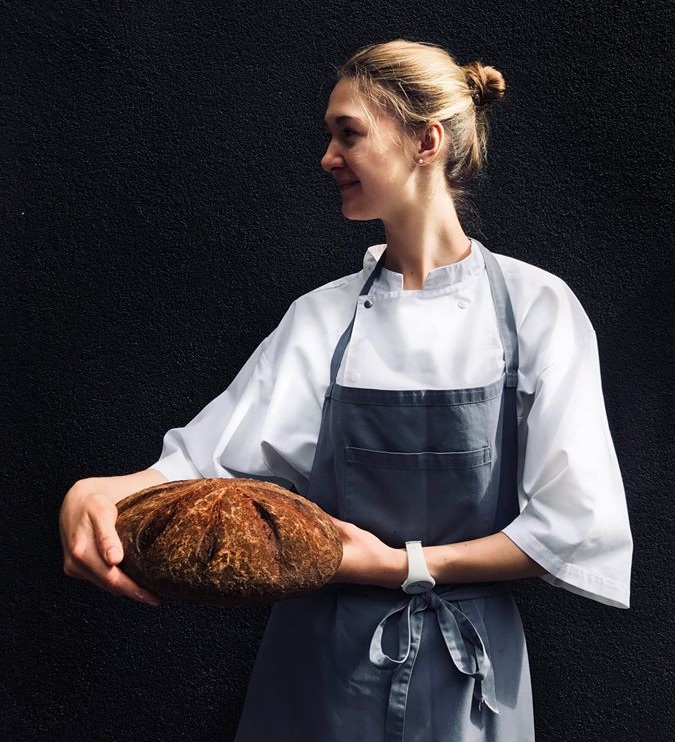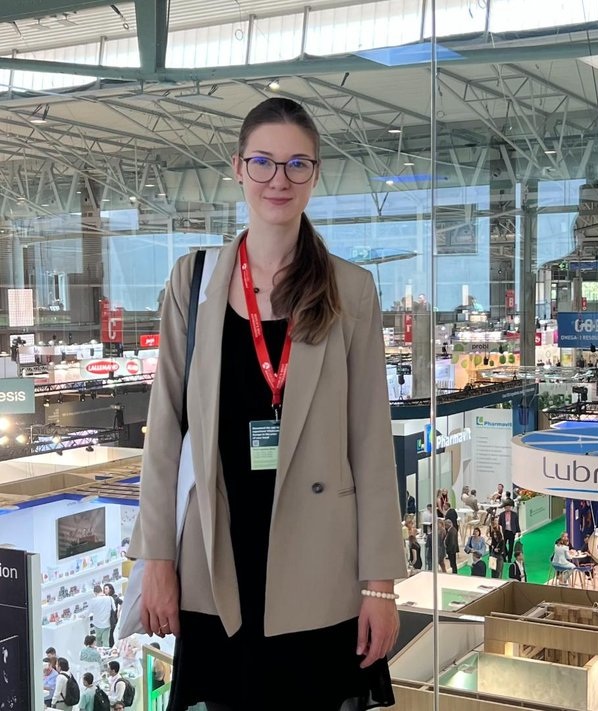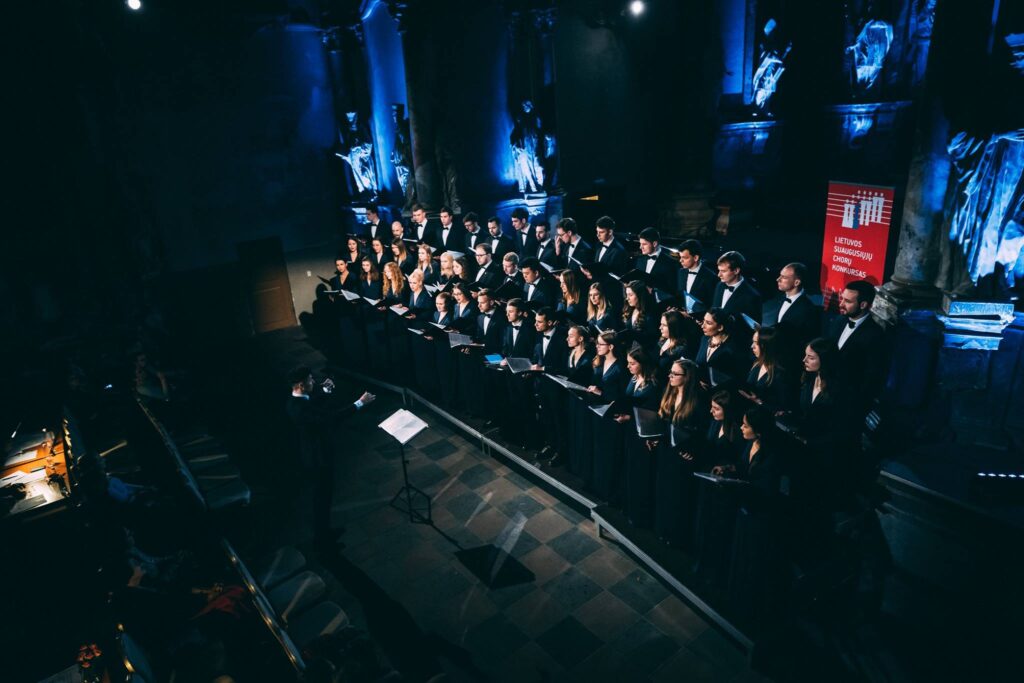A Fascinating Path from Michelin-Starred Kitchens to Life-Saving Projects

Working in some of the best restaurants – even those listed in the Michelin Guide – contributing to the enhancement of vitamin formulations for developing countries, and creating new food products are just a few examples from the successful career of Kristina Liukaitytė, Senior Expert in International Product Marketing. Her distinctive professional journey began at the Lithuanian University of Health Sciences (LSMU), where she chose the Food Science programme at the Faculty of Veterinary Medicine.
From Practical Tasks to Memorable Internships
Kristina chose her studies because of their uniqueness: the programme combines knowledge of food production, chemistry, biochemistry, biology, physics, technology, and health sciences. While there was some uncertainty at the time due to the programme being new, she had no doubts about choosing the university itself.

“I have always been interested in nutrition and food, and I enjoyed cooking. Since childhood, I have been drawn to cuisine and the food industry. At school, I became curious about restaurants, food safety, and quality, and I independently delved into food standards and label reading. LSMU was on top of my preferences as it had good reputation, modern laboratories, and integration with health sciences. When I applied to the Food Science programme in the Faculty of Veterinary Medicine, it was the first intake of the programme, so there was a bit of uncertainty – but I am happy with my choice,” she shares.
Although the lectures required her to memorise a lot of theoretical material, this was well balanced by engaging practical classes and captivating laboratory work.
“I liked that there was a lot of hands-on assignments. We didn’t just learn food processes theoretically – we baked bread, brewed beer, made cheese and preserves ourselves. We conducted food safety tests in the lab, examined which processes were safer, and investigated how product shelf life is tested,” she recalls.
The Food Science programme provided a strong theoretical foundation that proved useful in practice. Kristina gained further knowledge and skills both in Lithuania and abroad.
“There were many internships, training sessions, and short-term contracts which I would undertake alongside my main job. I would travel to Switzerland, Germany, France, Denmark, Italy, the USA, the UK, and Ukraine for work related to my specialisation. I had the opportunity to work in several Michelin-starred restaurants, a chocolate factory in Denmark, and an industrial bakery in San Francisco, USA – where I also studied at a private bread-baking institute and earned a diploma in advanced bread-making technology,” the specialist recounts.
University Life Also Brought Joy
Kristina remembers actively participating in various university activities. She sang in the LSMU choir ‘Neris’ and co-founded the Food Society with fellow students, where they would share food-related news and interesting facts.

“We would go on field trips to food companies and food fairs. We also organised food science events with lecturers, where we invited guests and teaching staff to gather after lectures or work and share their knowledge. I know that after my studies, the Student Scientific Society’s Food Science Circle was established, so today’s Food Science students still have opportunities to get involved,” she says.
For those considering applying to LSMU, she advises being prepared to work hard. Nevertheless, anything can be achieved provided there is genuine interest.
“The workload in some subjects is unquestionably heavy, but LSMU is a higher education institution, and that is to be expected. If you are determined, it is even possible to combine studies with work. People here are very warm-hearted, there is a variety of activities and student organisations. Studying in a programme with like-minded peers is rewarding. If you are interested in food science, I can assure you that you will meet peers who are passionate about food, food production, nutrition, and health,” she says with a smile.
Experience in Michelin-Starred Restaurants

Today, Kristina works at the Swiss headquarters of DSM-Firmenich, in the Nutrition and Care business group, specialising in vitamin products. However, her career started over 12 years ago, working in restaurants while still a student – rising from kitchen assistant to head pastry chef.
“I worked at prestigious Lithuanian restaurants such as ‘Džiaugsmas’, ‘Nüman’, ‘Nineteen18’, and at the hotel ‘Pacai’ – ‘Nordic Food Republic’. I also had a chance to work in a one-Michelin-starred restaurant in Switzerland and completed an internship at the two-star Michelin restaurant CODA in Germany. I also worked as a food technologist, continued studying the science of baking, and helped open several bakeries. I was involved in the development of new products. Among the most memorable projects was the one where we had to enhance the recipe of the Lithuanian vegan chocolate ‘Ach’,” she says, describing the beginning of her career.
Later, she deepened her knowledge through a Master’s programme in France, earning two degrees: in Food and Agricultural Sciences and in Business Administration.
“While studying for my Master’s, I worked at an international market research company where we researched tastes and consumer preferences for food and beverages. Simply put, we studied what ‘delicious’ means in different countries. Later I became interested in marketing, but at the same time I didn’t want to drift away from food and nutrition. Eventually, I found a job that enabled me to combine both,” she shares.
Great Responsibility at Work
Kristina now works with more than 150 different forms of vitamins. Her daily work involves engaging with an international team and collaborating with colleagues from over 100 countries.
“I deal with various nutrition segments: the food and beverage industry, food fortification, dietary supplements, infant nutrition, medical nutrition, and pharmaceuticals. I analyse our products and those of competitors, study production processes, ingredient benefits, and scientific research. I translate all of this into ‘human language’ – so our clients and sales teams understand what makes our products unique, which form suits respective product and application,” she explains.
Her job also comes with a range of challenges. One of the biggest is the responsibility of information and communicating it accurately to clients.
“What we communicate to clients can reach millions of end consumers. It is therefore essential to make sure everything is correct, supported by evidence, and clear. By working together with scientists, legal experts, and technologists, we must verify and confirm that the information we share is accurate. It may relate to technologies, ingredient formulations for end products, health benefits of ingredients, or scientific study results – such as bioactivity, solubility, absorption, or stability,” she says.
From Fascinating Knowledge to Meaningful Projects
Kristina has been involved in projects aimed at improving nutrition and health in vulnerable communities around the world.
“There was a need to create a more stable form of vitamin A for food fortification in developing countries – to increase the nutritional value of flour with vitamin A. This is one of the least stable vitamins, so during transport, storage, or production, its activity decreases – especially in hot, humid regions with challenging food safety conditions. The result was a more sustainable, clean-label, more stable, and smaller-particle-size dry vitamin A palmitate. Our ingredients, a large portion of which is vitamin A, reach over 640 million people in vulnerable groups worldwide who lack essential minerals and vitamins. It is a wonderful feeling knowing that my work helps improve people’s health,” she says.
The dynamic job also provides a sense of inner fulfilment.
“I enjoy building my knowledge every single day. One day it is fermentation, the next I am diving into raw material supply chains. I was surprised to learn, for example, that in Europe, vitamin C is not made from citrus fruits, but from maize or wheat,” says Kristina.
Knowledge Useful at Work and in the Kitchen
With more than 12 years of experience in the food industry, she also uses her expertise in daily life. She believes that knowing what you eat or drink makes life not only more interesting but safer.
“Understanding food labels is very useful. I can also apply my knowledge in food chemistry when I combine ingredients at home.
Even before my studies, I was fascinated by the flavour pairing theory. I now choose food products and supplements more responsibly, am better informed about food ingredients, and learn about new findings and studies – both technological and clinical – on healthier products, ingredients, and innovations. With knowledge of food science, I can eat more healthily and deliciously,” she explains.
She shares her knowledge not only with clients but also with others.
“I unwind from office work in the kitchen. I make kombucha and homemade vinegar, bake bread, and I am always fermenting something. I also share my culinary stories on Instagram,” says LSMU Food Science graduate Kristina Liukaitytė.
Learn more about the Faculty of Veterinary Medicine
